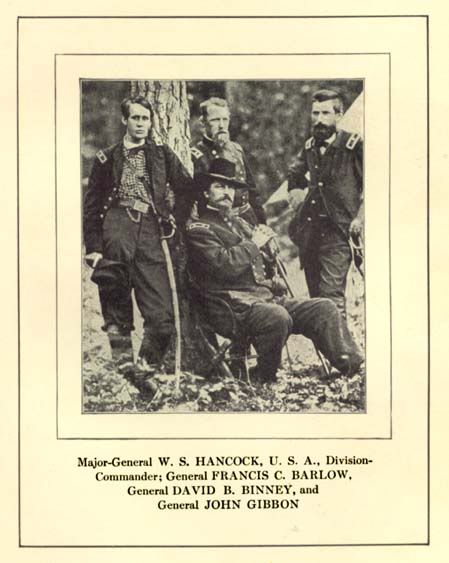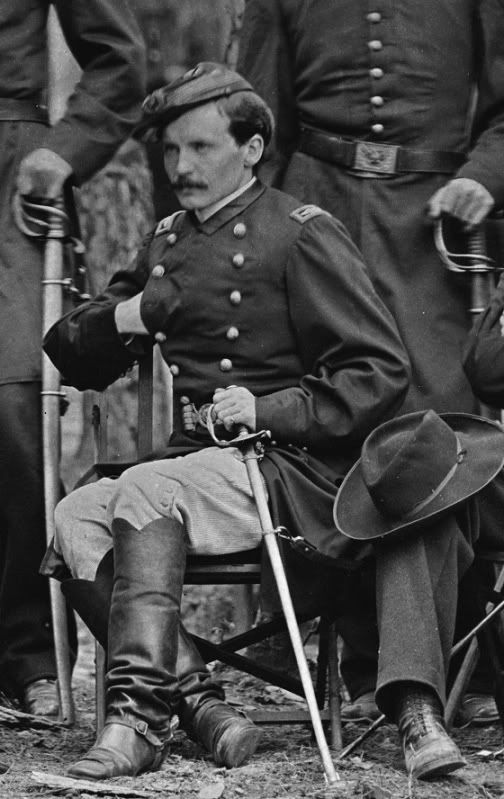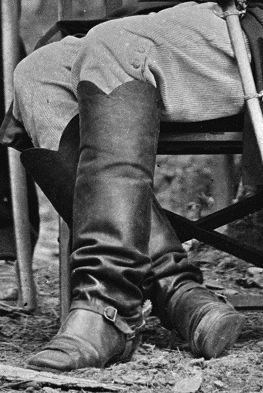I need some help here fellers. I have tackled something a bit tough to research. I have searched and searched (books and engines) and I have only been able to come up with one concrete source...thanks to Matthew Rector. I have been trying to find sources to where an infantry officer carried a cavalry sword in battle. I heard people say they did, but I am looking for facts. I am working on an impression for an event down the road, but if there is not enough sources, I am not going to go through with it. Here is the only source I got as of now:
Captain Edgar M. Ruhl, of Company D, was born at Shrewsbury, Pa., June 14, 1841, and was a son of Major N. G. Ruhl. He entered Company D as Second Sergeant in September, 1861, was promoted to First Sergeant May n, 1862, to Second Lieutenant Oct. 25, 1862, to First Lieutenant May 10, 1863, and to Captain April 20, 1864. During the fall of 1863 and the early months of 1864, he served as an aide on the staff of General French, commanding the Third Corps. Captain Ruhl was in command of Company D during the campaign of 1864, and was a brave and fearless officer. When the regiment returned home at the expiration of its term of service, he remained with the re-enlisted men and the new recruits who were formed into a battalion, and he was made its commander. Early in the morning of Oct. 19, 1864, while firing a revolver, brandishing his sword and urging on his men to aid the other forces m resisting a sudden attack of the enemy at Cedar Creek, Virginia, Captain Ruhl was struck by a minie ball, which passed through his body, severing a large artery. He threw up his hands and said, "Boys, its all up with me." He died a few mmutes later. Some of his men carried his body to the rear and secured his sword and some valuables which he had in his pockets and sent them home. When the Union forces retreated from the field, Captain Ruhl's body fell into the hands of the enemy. But when the army, upon the arrival of Sheridan, moved forward in the afternoon his comrades recovered the body and gave it a temporary burial. It was afterward removed to Shrewsbury, Pa., and buried there with military honors. The loss of Captain Ruhl was deeply felt. He was held in high favor among all his men. Captain Edgar M. Ruhl Camp Sons of Veterans at York, Pa., is named in honor of him. A lifesize portrait of Captain Ruhl adorns one of the walL of the camp room. The cavalry saber carried by him when he was killed, was presented to the Camp by Chaplain Eberhart, who had picked it up from a battle field and loaned it to Captain JRuhl while the latter's sword was being repaired in Baltimore.
George Reeser, History of the Eighty-Seventh Regiment, Pennsylvania Volunteers (York, PA: Press of the York Daily, 1903), 302-303.
Any help or direction would be great. Thank guys!
Captain Edgar M. Ruhl, of Company D, was born at Shrewsbury, Pa., June 14, 1841, and was a son of Major N. G. Ruhl. He entered Company D as Second Sergeant in September, 1861, was promoted to First Sergeant May n, 1862, to Second Lieutenant Oct. 25, 1862, to First Lieutenant May 10, 1863, and to Captain April 20, 1864. During the fall of 1863 and the early months of 1864, he served as an aide on the staff of General French, commanding the Third Corps. Captain Ruhl was in command of Company D during the campaign of 1864, and was a brave and fearless officer. When the regiment returned home at the expiration of its term of service, he remained with the re-enlisted men and the new recruits who were formed into a battalion, and he was made its commander. Early in the morning of Oct. 19, 1864, while firing a revolver, brandishing his sword and urging on his men to aid the other forces m resisting a sudden attack of the enemy at Cedar Creek, Virginia, Captain Ruhl was struck by a minie ball, which passed through his body, severing a large artery. He threw up his hands and said, "Boys, its all up with me." He died a few mmutes later. Some of his men carried his body to the rear and secured his sword and some valuables which he had in his pockets and sent them home. When the Union forces retreated from the field, Captain Ruhl's body fell into the hands of the enemy. But when the army, upon the arrival of Sheridan, moved forward in the afternoon his comrades recovered the body and gave it a temporary burial. It was afterward removed to Shrewsbury, Pa., and buried there with military honors. The loss of Captain Ruhl was deeply felt. He was held in high favor among all his men. Captain Edgar M. Ruhl Camp Sons of Veterans at York, Pa., is named in honor of him. A lifesize portrait of Captain Ruhl adorns one of the walL of the camp room. The cavalry saber carried by him when he was killed, was presented to the Camp by Chaplain Eberhart, who had picked it up from a battle field and loaned it to Captain JRuhl while the latter's sword was being repaired in Baltimore.
George Reeser, History of the Eighty-Seventh Regiment, Pennsylvania Volunteers (York, PA: Press of the York Daily, 1903), 302-303.
Any help or direction would be great. Thank guys!








Comment